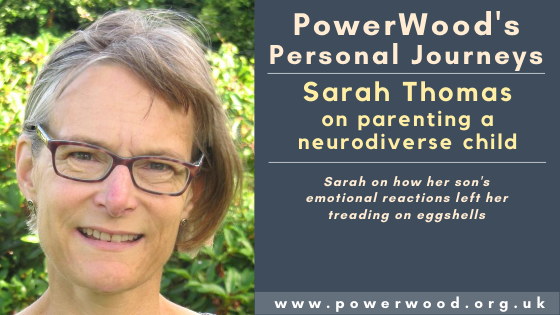
I was hostage to my fear of sparking a violent emotional outburst.
It’s natural to want our children to be happy, to feel disturbed when they’re frustrated, angry or scared. But what if your child’s emotional reactions are so intense that you’re frightened to trigger one? If you also have emotional overexcitability, you then struggle with your intense counter reaction.
This was me; I was scared of my son. I was hostage to my fear of sparking a violent emotional outburst. I felt constantly on alert. I limited my behaviour and narrowed my life to avoid potentially difficult situations. I found myself lying: ‘Emma won’t be walking at the beach today either’ or ‘ We were only going to have a quick chat anyway’ (when really it was a planned afternoon get together). I then also had the anxiety of remembering not to contradict myself and the worry about whether someone else would reveal sensitive information. I walked on eggshells, frequently reverting to a fawn response with my son; it was not really a joke that I was referred to as a ‘slave’! I would stop whatever I was doing when he shouted for attention. I was then frustrated by the interruption so rushed him or did not really attend to his problem so I could resume my task. I struggled to concentrate, felt I never had any time to think. The family atmosphere felt tense.
I felt guilty for my dishonesty and deception. I hated the way that I was being: easily irritated, always feeling on edge, snappy or withdrawn. I resented all the restrictions upon our freedom to do ‘normal’ family things but I felt I could not cope otherwise. I felt exhausted; my life felt joyless and empty.
This was the situation when we turned to Simone for coaching, to rescue us from spinning in ever decreasing circles. I remember what a relief it was that Simone immediately seemed to understand the situation. I instantly felt less alone; it was not all my fault. Simone acknowledged ‘our children are not easy peasy!’
The ‘diagnosis’ was emotional dependency. I felt OK as long as my son, who is now 10, felt OK. If he experienced uncomfortable feelings I reacted: I was frightened of his intense feelings; I had to fix or banish his difficult feelings because I could not bear them. Simone explained this created a false sense of security for my son as explained in the Cycle of Emotional and Sensory Overload. If he could get me to react, he gained a sense of power; he was in control of the situation; his uncomfortable feelings were transferred to me. His problem was dumped onto me. This unwieldy burden too often led to my ‘flipping’, losing it: shouting or lashing out and feeling I had failed in keeping things calm. Moreover, I would then devise increasingly complicated strategies to avoid encountering similar situations in future.
I really wanted to escape this vicious cycle. Simone’s ‘solution’ was to develop ‘emotional independence’ and to model and to coach dealing with uncomfortable feelings. My son would then be able to learn to deal with his difficult emotions so that they did not stifle his development and limit his potential.
Reflecting upon this diagnosis, I realised I have always struggled with uncomfortable feelings. It is a challenge to employ helpful coping strategies rather than less helpful methods such as distraction, avoidance of potentially challenging situations, or fawning. I blamed my inadequacy as a parent for causing our problems. Thankfully, Simone reminded me to avoid recriminations, the negative cycle of self-blame. Having self-compassion as well as insight can best facilitate change. I could alter the dynamics. I could begin to develop emotional independence. Moreover, there were tools that would help.
Humour was one such ‘tool’ and one that I have found particularly effective in defusing and de-escalating conflict. It helps forestall argumentative talk and the triggering of stress responses. It also can prevent me from being coerced into doing something simply because I am not strong enough to resist my son’s persistent demands. For example, he was insisting we watched a cartoon with him before breakfast even though we did not have time to do that right then. Instead of trying to remonstrate with my son, my husband stamped his foot and declared ‘I have to have coffee now, immediately Mummy, coffee!’. We all laughed and we quite happily watched the cartoon later. We also had a conversation later about how we were a team and had to help one another so that everyone managed to get what they needed from each other.
The ‘kind voice’ is another tool I have employed when I might otherwise struggle to maintain emotional independence. So, if my son says ‘why is life so boring?’ I find it a challenge not to react and feel anxious whilst wracking my brains to come up with something he would like to do, or a persuasive argument to dispute this. Instead, I reply in an even tone ‘you’re so bored’. I can then avoid getting into the stress response of feeling I have to fix it.
I am on a journey. I still feel triggered by my son’s emotional reactions but I think I am more aware of the dynamics of the interaction, and I can change my behaviour and not feel responsible to fix his negative emotions. I still struggle with my own uncomfortable feelings and try to continue to work on developing helpful ways to deal with them. I still flounder and ‘flip’. However, beginning to break the cycle of emotional dependence has been transformative for our family life and I hope I am helping my son to develop the skills he needs to manage his strong feelings.
© Sarah Thomas 2020
